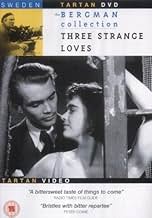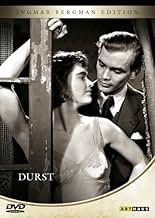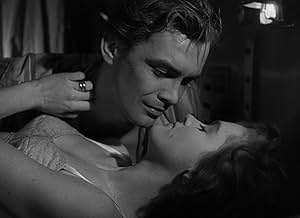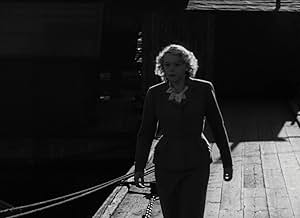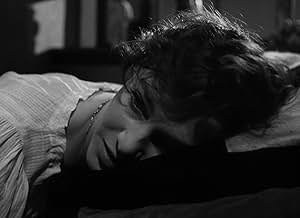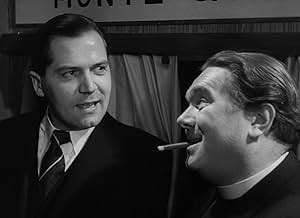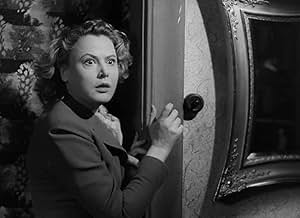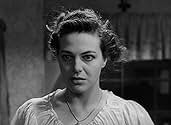VALUTAZIONE IMDb
6,5/10
3055
LA TUA VALUTAZIONE
Una coppia bisognosa in un cattivo matrimonio torna a Stoccolma dopo un viaggio in Italia. Nel frattempo, una vedova resiste alle seduzioni di due persone diverse: il suo psichiatra e un'ami... Leggi tuttoUna coppia bisognosa in un cattivo matrimonio torna a Stoccolma dopo un viaggio in Italia. Nel frattempo, una vedova resiste alle seduzioni di due persone diverse: il suo psichiatra e un'amica lesbica.Una coppia bisognosa in un cattivo matrimonio torna a Stoccolma dopo un viaggio in Italia. Nel frattempo, una vedova resiste alle seduzioni di due persone diverse: il suo psichiatra e un'amica lesbica.
- Regia
- Sceneggiatura
- Star
Mimi Nelson
- Valborg - Ruts kamrat i balettskolan
- (as Mimmi Nelson)
Carl Andersson
- En man i kupén med festande tågpassagerare (1)
- (non citato nei titoli originali)
Wiktor Andersson
- Doorkeeper
- (non citato nei titoli originali)
Verner Arpe
- Tysk biljettsamlare
- (non citato nei titoli originali)
Ingmar Bergman
- Tågpassagerare
- (non citato nei titoli originali)
Britta Brunius
- Sjuksköterskan efter Ruts abort
- (non citato nei titoli originali)
Calle Flygare
- Den danske prästen på tåget
- (non citato nei titoli originali)
Sven-Eric Gamble
- Glasmästeriarbetaren på Rosengrens mottagning
- (non citato nei titoli originali)
Inga Gill
- Lady at Hotel
- (non citato nei titoli originali)
Herman Greid
- Stadsbudet i Basel
- (non citato nei titoli originali)
Helge Hagerman
- Den svenske prästen på tåget
- (non citato nei titoli originali)
Recensioni in evidenza
Ingmar Bergman very quickly became one of my favourite directors. Have only been familiar with him since 2012 which was around the period when my film and television taste started to broaden, but it was easy to be intrigued by his distinctive directing style so it was easy to get into his work. Not all his films are great and he was not immune from misfires, but many of them are very, very good and even masterpieces, it is not hard to see why he became such a big influence in cinema.
None of Bergman's late-40s films, when he was still learning his craft and finding his style, are among his best work. It was around the early-mid-50s when he began to come into his own. His early films are still interesting though and there are not really any duds. The most commercially successful of Bergman's early films, 'Three Strange Loves' as called in my country is certainly very intriguing and it is well done in a lot of areas. The story is very flawed and something of a big caveat but 'Three Strange Loves' is fine from a directing standpoint and has a lot to recommend.
'Three Strange Loves' story could have been executed better. The structure is very jumpy, with some constant backing and forthing that was sometimes hard to follow. The flashbacks intrigue mostly but occasionally drag and some could have been placed better and not as randomly introduced or as fragmented.
Do agree as well that the supporting characters' subplots are not as involving as that of the central couple. Some are also not as necessary or as cohesive as others and feel like padding.
On the other hand, 'Three Strange Loves' is well made visually, with the photography being both stylish and atmospheric. Bergman's directing was becoming more refined all the time and there are enough glimmers of brilliance, one can see his distinctive style coming through in some of the more symbolic imagery. The music complements the tone very well and fits appropriately. The script is thought-provoking and sometimes poetic.
Although the story's execution could have been much better, it fascinates thematically with heavy themes not trivialised and actually pretty daringly uncompromising. The tone, revolving around an ahead-of-its-time and not as frequently portrayed back then subject, is bleak and purposefully not a pleasant watch, but the central couple plot is often harrowing and has genuine moments of poignancy. Complete with a strongly written female lead character and the two lead performances are quite powerful.
In a nutshell, well done early on but Bergman went on to much better things. 7/10
None of Bergman's late-40s films, when he was still learning his craft and finding his style, are among his best work. It was around the early-mid-50s when he began to come into his own. His early films are still interesting though and there are not really any duds. The most commercially successful of Bergman's early films, 'Three Strange Loves' as called in my country is certainly very intriguing and it is well done in a lot of areas. The story is very flawed and something of a big caveat but 'Three Strange Loves' is fine from a directing standpoint and has a lot to recommend.
'Three Strange Loves' story could have been executed better. The structure is very jumpy, with some constant backing and forthing that was sometimes hard to follow. The flashbacks intrigue mostly but occasionally drag and some could have been placed better and not as randomly introduced or as fragmented.
Do agree as well that the supporting characters' subplots are not as involving as that of the central couple. Some are also not as necessary or as cohesive as others and feel like padding.
On the other hand, 'Three Strange Loves' is well made visually, with the photography being both stylish and atmospheric. Bergman's directing was becoming more refined all the time and there are enough glimmers of brilliance, one can see his distinctive style coming through in some of the more symbolic imagery. The music complements the tone very well and fits appropriately. The script is thought-provoking and sometimes poetic.
Although the story's execution could have been much better, it fascinates thematically with heavy themes not trivialised and actually pretty daringly uncompromising. The tone, revolving around an ahead-of-its-time and not as frequently portrayed back then subject, is bleak and purposefully not a pleasant watch, but the central couple plot is often harrowing and has genuine moments of poignancy. Complete with a strongly written female lead character and the two lead performances are quite powerful.
In a nutshell, well done early on but Bergman went on to much better things. 7/10
Women on the verge of a nervous breakdown, men looking for dominance, acted out on a small scale: Here, Bergman serves up some technical and contentual elements which can be found throughout his later career. Several short stories written by Birgit Tengroth, who is playing Viola here, are melded, with the main plot involving Rut (Eva Henning) and Bertil (Birger Malmsten). But as soon as the couple arrives the train which will take them on a journey through Europe, Bergman somehow loses all side threads. One can sense how the director exerts to stage his idea of a marital- and love drama, though, it soon appears as a pretty faint attempt and at the end all plot lines remain fragmentarily. The characters and the images, however, linger. They tell the underlying story of Törst and convey this certain feeling of freedom, self-determination, and desire for love presented in a "steely, self-assured, stripped-down directorial style" which is Bergman's very own. That is why with this film one can expect something in the subsequent films of this yet young talent: a great subtlety in cinematic character psychology and lasting, poignant images.
While Ode to Joy is undoubtedly the gem of Eclipse's Early Bergman box set, Thirst is a close second, at least in my mind. It's kind of a precursor to Scenes of a Marriage, where the story follows a married couple (played by Eva Henning and Birger Malmsten) on a train trip through war-torn Europe. The tumult of the film comes not from the mostly ignored outside world, but from the rocky marriage itself. We also get glimpses of the couple's former lovers. The film is at its best when sticking to the couple. When it strays to the stories of side characters, it's weaker. Since the film is so short (just over 80 minutes), you have to wonder if some of the tangential stories were added as padding. But even the scenes that don't add much are well written, acted and directed. Henning gives a masterful performance, and Bergman was really coming into his own by this point.
Interesting film, but this is clearly not the very best of the great Bergman. Several relationships are examined under the microscope (so far, so Bergman). The film jumps around between the relationships in a slightly distracting way, but eventually you get to the bottom of who used to be with whom etc.
Gosh it's bleak out there, Bergman seems to share Strindberg's views on marriage and relationships at this time - the references to Strindberg stress that point. There's adultery, bitter rows between partners, lesbianism (inexplicit) and suicide. It ought to have me at the edge of my seat, but somehow doesn't quite do the business for me in the way that most Bergman films do. Perhaps this one hasn't aged well.
Worth seeing for the dedicated Bergman fan - it's pretty short and has its moments. If you are looking for an initial view of Bergman, look elsewhere.
Gosh it's bleak out there, Bergman seems to share Strindberg's views on marriage and relationships at this time - the references to Strindberg stress that point. There's adultery, bitter rows between partners, lesbianism (inexplicit) and suicide. It ought to have me at the edge of my seat, but somehow doesn't quite do the business for me in the way that most Bergman films do. Perhaps this one hasn't aged well.
Worth seeing for the dedicated Bergman fan - it's pretty short and has its moments. If you are looking for an initial view of Bergman, look elsewhere.
The early Bergman films are interesting in how they portray an artist evolving with increased experience. They're not always successful artistic endeavors overall, but they show how a studio system can foster and hone talent through experience.
Thirst tells the story of a young married couple on their way back from a vacation in Italy. We see them in France as they are about to board a train through 1946 Germany back towards Sweden. The woman is haunted by a previous affair and a subsequent abortion all while she nurses a bad knee in the hopes that one day she will dance ballet again. The husband is a penny pinching academic obsessed with coins and who had had an affair with another woman out of, what he calls, pity for her status as a widow. None of this is a secret, all of the sins are out in the open.
The two have the kind of talks typical in Bergman films (in particular his later, post-existential films like Scenes from a Marriage) and come to the conclusion that they should reconcile their differences and try to work through their problems to a happy marriage in the film's final moments.
The problem with the movie is its structure. This could be a case study in a poorly structured story pretty much killing a film. The first twenty minutes are dedicated to flashbacks to the wife's affair with a lieutenant in the Swedish military before we ever meet the husband. The husband's lover is first mentioned about thirty minutes into the movie, and she is introduced a few minutes later in a scene with her cruel psychologist. She then disappears for a half hour. There's also the wife's old dancing friend who appears in another flashback and then shows up with the husband's former lover, trying to seduce her which ends up leading to the lover's suicide.
The problem isn't the events themselves, but the fact that they are bunched together without any real effort to weave it in and out of the other threads. As typical, I read the essay in the Criterion Collection's large book and was unsurprised to discover that the script (which Bergman didn't write) was based on a series of short stories. Considering my issues with the film's structure, it made perfect sense. It felt very staccato with one story going through its beginning, middle, and end before another one took over. It's not quite that, but, especially considering the initial twenty minutes with the wife's lover, it feels very apropos.
I do think that if the movie had been re-arranged it would have worked better. I don't think it's something that purely an editing job would have done. At least some of it would have needed to originate at the script. The husband's lover needed at least one more scene to flesh her out for instance (her first scene with the psychologist is highly emotionally delivered and feels out of place because we had never met her before).
Stylistically, the movie feels very Bergman. The topics he loved are there (the marriage, even the dancer is a performer that he frequently featured). His visual style sometimes feel a little more active than normal, but we clearly see his visual tics such as two people in frame talking to each other, letting actors demonstrate who they are through long exposures to their smaller actions, and strong performances throughout. I just wish the story had been arranged in a way that made sense.
Thirst tells the story of a young married couple on their way back from a vacation in Italy. We see them in France as they are about to board a train through 1946 Germany back towards Sweden. The woman is haunted by a previous affair and a subsequent abortion all while she nurses a bad knee in the hopes that one day she will dance ballet again. The husband is a penny pinching academic obsessed with coins and who had had an affair with another woman out of, what he calls, pity for her status as a widow. None of this is a secret, all of the sins are out in the open.
The two have the kind of talks typical in Bergman films (in particular his later, post-existential films like Scenes from a Marriage) and come to the conclusion that they should reconcile their differences and try to work through their problems to a happy marriage in the film's final moments.
The problem with the movie is its structure. This could be a case study in a poorly structured story pretty much killing a film. The first twenty minutes are dedicated to flashbacks to the wife's affair with a lieutenant in the Swedish military before we ever meet the husband. The husband's lover is first mentioned about thirty minutes into the movie, and she is introduced a few minutes later in a scene with her cruel psychologist. She then disappears for a half hour. There's also the wife's old dancing friend who appears in another flashback and then shows up with the husband's former lover, trying to seduce her which ends up leading to the lover's suicide.
The problem isn't the events themselves, but the fact that they are bunched together without any real effort to weave it in and out of the other threads. As typical, I read the essay in the Criterion Collection's large book and was unsurprised to discover that the script (which Bergman didn't write) was based on a series of short stories. Considering my issues with the film's structure, it made perfect sense. It felt very staccato with one story going through its beginning, middle, and end before another one took over. It's not quite that, but, especially considering the initial twenty minutes with the wife's lover, it feels very apropos.
I do think that if the movie had been re-arranged it would have worked better. I don't think it's something that purely an editing job would have done. At least some of it would have needed to originate at the script. The husband's lover needed at least one more scene to flesh her out for instance (her first scene with the psychologist is highly emotionally delivered and feels out of place because we had never met her before).
Stylistically, the movie feels very Bergman. The topics he loved are there (the marriage, even the dancer is a performer that he frequently featured). His visual style sometimes feel a little more active than normal, but we clearly see his visual tics such as two people in frame talking to each other, letting actors demonstrate who they are through long exposures to their smaller actions, and strong performances throughout. I just wish the story had been arranged in a way that made sense.
Lo sapevi?
- QuizThe first of three theatrical films directed by Ingmar Bergman that he did not write.
- Versioni alternativeThe Tartan region 2 DVD restores the ending of the scene between Viola and her lesbian former schoolmate Valborg, in which the latter tries to seduce the former by getting her drunk. This had been cut by the Swedish censors before the film's original release and had never been seen publicly before 2004.
- ConnessioniReferenced in Dårskapens hus (1951)
- Colonne sonoreNon più andrai
(uncredited)
from "Le nozze di Figaro"
Music by Wolfgang Amadeus Mozart
Swedish Lyrics by Bernhard Crusell
Sung by Bengt Eklund
I più visti
Accedi per valutare e creare un elenco di titoli salvati per ottenere consigli personalizzati
- How long is Thirst?Powered by Alexa
Dettagli
- Tempo di esecuzione
- 1h 23min(83 min)
- Colore
- Proporzioni
- 1.33 : 1
Contribuisci a questa pagina
Suggerisci una modifica o aggiungi i contenuti mancanti

